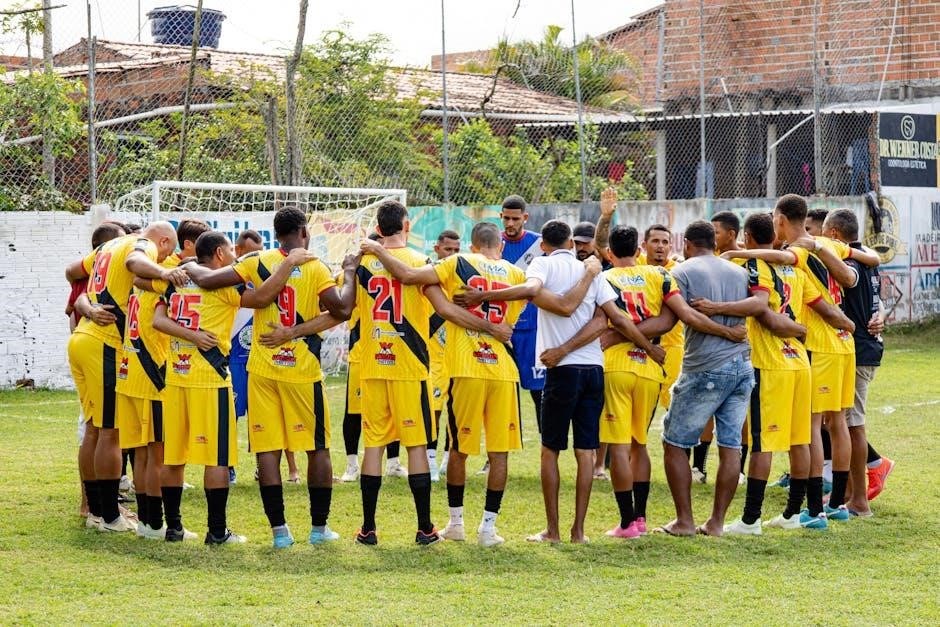Off-season soccer training programs are essential for maintaining fitness‚ reducing injury risks‚ and enhancing performance. They focus on strength‚ speed‚ agility‚ and soccer-specific skills‚ providing a structured approach to prepare for the upcoming season effectively.
Why Off-Season Training is Crucial for Soccer Players
Off-season training is vital for soccer players to maintain and improve their fitness levels‚ reduce injury risks‚ and enhance overall performance. It allows players to focus on strength‚ speed‚ agility‚ and endurance‚ which are critical for excelling during the competitive season. Without off-season conditioning‚ athletes may lose physical conditioning‚ leading to subpar performance and increased injury susceptibility. A well-structured off-season program helps players build a strong foundation‚ addressing weaknesses and improving technical skills. Additionally‚ it ensures a smooth transition into pre-season training‚ keeping players physically and mentally prepared for the demands of the upcoming season. Consistency during the off-season is key to long-term success in soccer.
Understanding the Structure of a Typical Off-Season Program
A typical off-season soccer program is divided into phases‚ each targeting specific fitness goals. The initial phase focuses on building strength and endurance‚ while later phases emphasize speed‚ agility‚ and soccer-specific skills. Programs often include weight training‚ plyometrics‚ and conditioning exercises. They may last 6 months‚ with structured weekly routines like 3 or 2 days of weight training. Proper nutrition and recovery are also emphasized to optimize gains. The program’s design ensures a gradual progression‚ preparing players for the demands of pre-season training and the upcoming competitive season effectively.
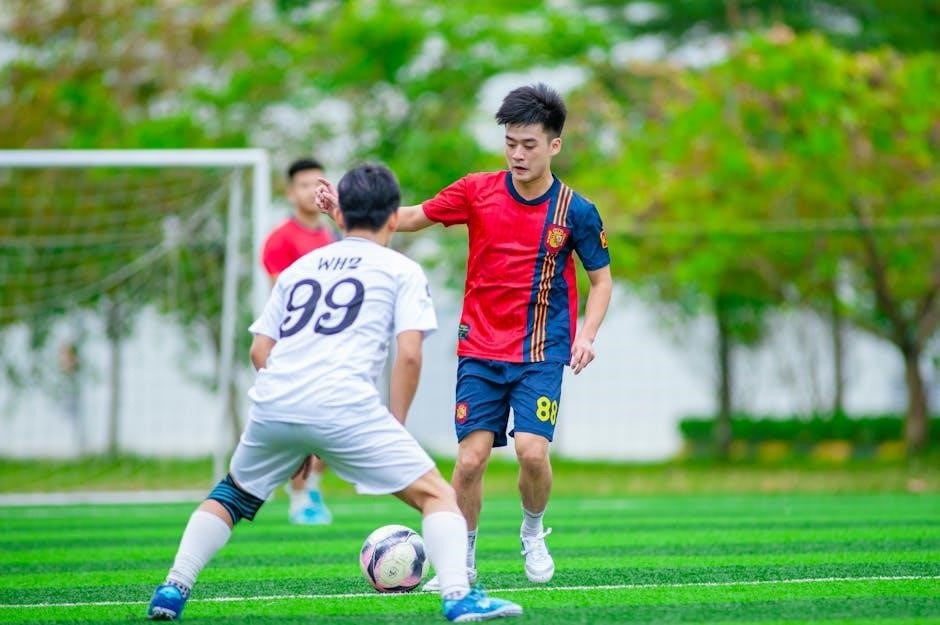
Key Components of an Effective Off-Season Soccer Program
Effective off-season programs include strength training‚ speed drills‚ cardiovascular exercises‚ and soccer-specific skills. They also incorporate proper nutrition‚ recovery techniques‚ and mental preparation to enhance overall performance.
Strength Training Exercises for Soccer Players
Strength training is vital for soccer players to build muscle‚ improve power‚ and prevent injuries. Key exercises include deadlifts‚ bench presses‚ pull-ups‚ and single-leg broad jumps. These workouts target the lower and upper body‚ enhancing overall stability and explosiveness. Incorporating functional exercises like box squats and step-ups mimics soccer movements‚ improving game performance. Players should focus on compound movements that work multiple muscle groups simultaneously. Proper form and progressive overload are crucial to ensure continuous progress; Strength training should be integrated with speed and agility drills to maximize effectiveness. A well-structured program helps players develop the physical resilience needed for the demands of the sport.
Speed and Agility Drills to Enhance Performance
Speed and agility drills are fundamental for soccer players to improve acceleration‚ deceleration‚ and quick directional changes. Sprints‚ ladder drills‚ cone exercises‚ and shuttle runs are effective for enhancing agility. These exercises focus on explosiveness and reaction time‚ crucial for outpacing opponents. Incorporating plyometric movements‚ such as bounds and lateral jumps‚ further boosts speed and agility. Players should perform these drills 2-3 times a week‚ progressively increasing intensity. Proper technique and recovery are essential to prevent overtraining. Combining these drills with strength training ensures a well-rounded physical preparation for the demands of the game; Consistency in these exercises leads to significant improvements in speed and agility over time.
Cardiovascular Endurance and Conditioning Workouts
Cardiovascular endurance and conditioning are vital for soccer players to maintain stamina and energy throughout matches. Workouts include interval training‚ high-intensity interval training (HIIT)‚ and long-distance running. These exercises improve heart health‚ increase lung capacity‚ and enhance overall endurance. Players should aim for 3-4 conditioning sessions per week‚ lasting 30-45 minutes. Incorporating hill sprints‚ agility ladder drills‚ and shuttle runs can further boost cardiovascular fitness. Progressive overload‚ such as increasing running distance or intensity‚ ensures continuous improvement. Proper hydration‚ rest‚ and nutrition are crucial to support these workouts; A well-structured conditioning plan ensures players are physically prepared for the demands of the soccer season.
Soccer-Specific Skills to Focus On
During the off-season‚ refining soccer-specific skills is essential for maintaining and improving technical abilities. Focus on ball control‚ dribbling‚ and precise passing. Shooting technique should be practiced regularly‚ emphasizing power and accuracy. Agility drills with the ball‚ such as cone exercises‚ enhance close control and quick directional changes. Additionally‚ work on set-piece skills like free kicks‚ corners‚ and throw-ins. Incorporate small-sided games to simulate game scenarios‚ improving decision-making and spatial awareness. Video analysis can help identify weaknesses and track progress. Regular ball work ensures players remain sharp and prepared for the upcoming season‚ making technical refinement a cornerstone of off-season training programs.

Sample Off-Season Training Programs
These programs include 6-month and 6-week plans‚ focusing on strength‚ conditioning‚ and skill work‚ ensuring players improve fitness and prepare effectively for the pre-season.
A 6-Month Workout Plan for High School and Collegiate Players
This comprehensive program is designed for both high school and collegiate soccer players‚ offering a structured approach to improve strength‚ endurance‚ and soccer-specific skills. The plan is divided into phases‚ each focusing on different aspects of fitness and performance. The first phase emphasizes building foundational strength through weight training and plyometrics. The second phase transitions into speed and agility drills‚ while the third phase incorporates sport-specific conditioning to simulate game scenarios. Each phase lasts approximately two months‚ allowing for gradual progression and adaptation. The program also includes weekly scheduling recommendations‚ ensuring a balanced approach to training and recovery.
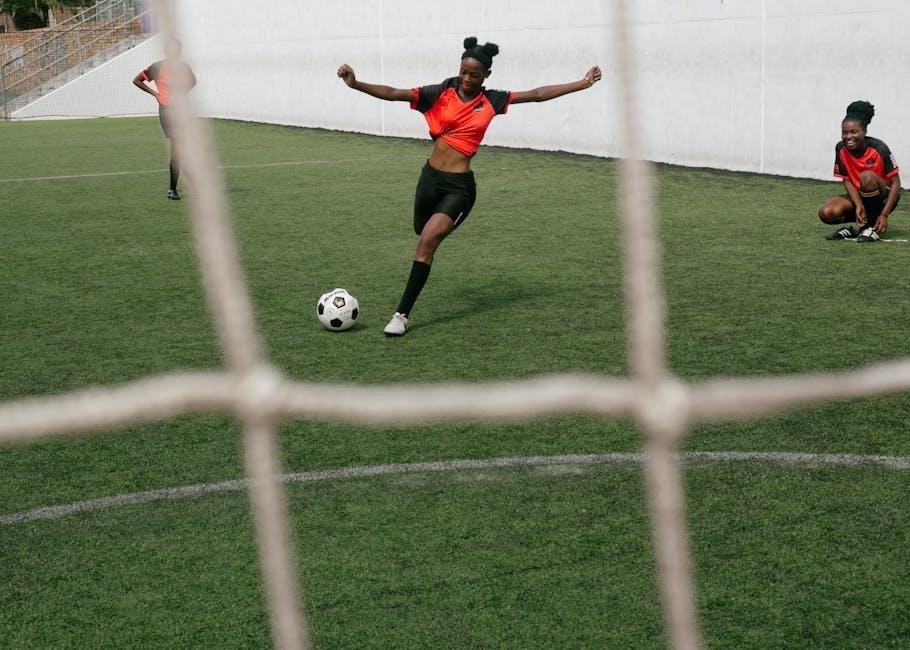
A 6-Week Program for Pre-Season Preparation
This 6-week program is tailored to prepare soccer players for the upcoming season‚ focusing on functional training‚ speed‚ agility‚ and conditioning. Each week includes specific drills and exercises designed to enhance performance. Week 1 emphasizes foundational strength and endurance‚ while Weeks 2-3 introduce dynamic movements and ball work. Weeks 4-5 focus on high-intensity interval training and game-specific scenarios‚ such as small-sided games. The final week involves tapering to ensure peak readiness. The program incorporates plyometrics‚ sprinting exercises‚ and tactical drills‚ ensuring players are physically and technically prepared for the season’s demands. This structured approach guarantees a seamless transition into competitive play.

Weight Training and Conditioning Routines
Weight training focuses on building strength through exercises like deadlifts‚ bench presses‚ and pull-ups‚ while conditioning enhances endurance and agility‚ crucial for soccer performance and injury prevention.
3-Day and 2-Day Weight Training Programs
A 3-day weight training program focuses on full-body strength‚ incorporating exercises like deadlifts‚ bench presses‚ and pull-ups‚ typically in 3-4 sets of 8-12 reps. A 2-day program emphasizes upper/lower splits‚ with exercises like squats and lunges‚ aiming to improve power and endurance. Both routines prioritize functional movements that translate to soccer performance‚ such as explosive power and stability. Consistency and progressive overload are key to achieving gains. These structured plans help athletes maintain fitness and build muscle during the off-season‚ ensuring they return stronger and more prepared for pre-season demands. Proper form and recovery are emphasized to prevent injuries and maximize results.

Incorporating Plyometrics and Functional Training
Plyometrics and functional training are vital for enhancing soccer-specific abilities. Plyometric exercises‚ such as box jumps and burpees‚ improve explosive power and acceleration. Functional training focuses on movements that mimic soccer actions‚ like lateral jumps and balance drills‚ to boost agility and coordination. These exercises enhance muscle reactivity and reduce injury risk. Incorporating them into a structured off-season program ensures players develop the strength‚ speed‚ and agility needed for peak performance. Consistent practice of these drills during the off-season leads to improved overall athletic ability and readiness for the upcoming soccer season.

Nutrition and Recovery Strategies
A balanced diet rich in proteins‚ carbohydrates‚ and healthy fats fuels recovery and performance. Proper hydration and post-workout nutrition are crucial. Adequate sleep and recovery techniques like stretching and ice baths enhance muscle repair and prevent injuries‚ ensuring optimal readiness for training and competition.
Dietary Recommendations for Off-Season Training
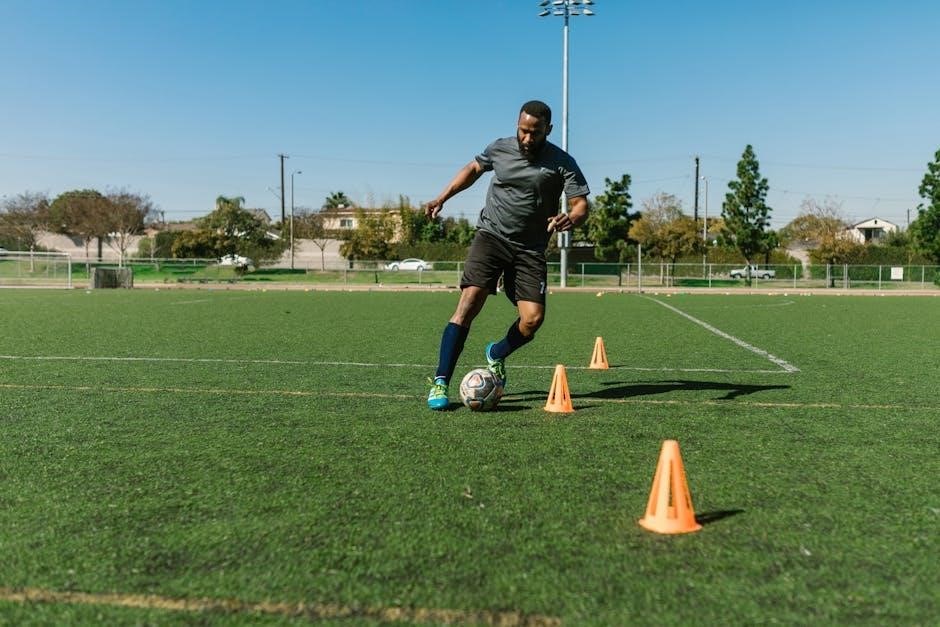
A well-balanced diet is crucial for off-season soccer training to support muscle recovery‚ energy levels‚ and overall performance. Soccer players should focus on consuming lean proteins like chicken‚ fish‚ and legumes to repair and build muscle tissue. Complex carbohydrates‚ such as whole grains‚ fruits‚ and vegetables‚ provide sustained energy for workouts. Healthy fats‚ including nuts‚ seeds‚ and avocados‚ are essential for optimal health and recovery. Hydration is key‚ with players advised to drink plenty of water throughout the day. Meals should be timed appropriately around training sessions‚ with a mix of carbs and protein post-workout to aid recovery. Avoiding fast food and sugary drinks is recommended to maintain peak fitness levels.
Recovery Techniques to Prevent Injuries
Proper recovery is vital for injury prevention during off-season soccer training. Techniques include dynamic stretching‚ foam rolling‚ and ice baths to reduce muscle soreness and improve flexibility. Active recovery‚ such as light jogging or swimming‚ promotes blood flow without overexertion. Adequate sleep (7-9 hours) is essential for muscle repair and mental rejuvenation. Massage therapy and compression garments can also aid in reducing muscle tension. Incorporating these methods ensures players maintain peak physical condition while minimizing the risk of injuries‚ allowing them to enter the next season strong and prepared.
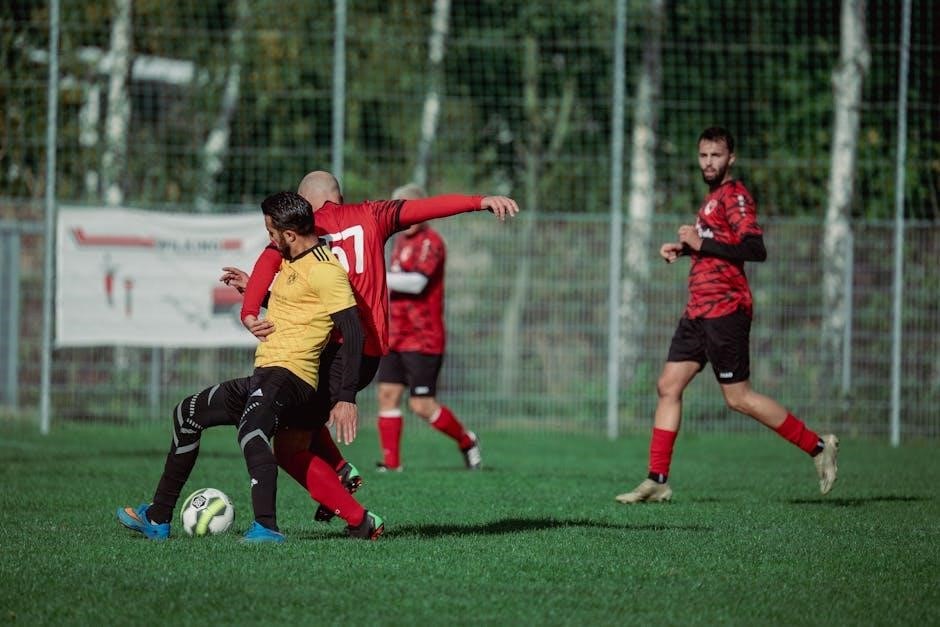
Mental Preparation and Skill Development
Mental preparation and skill development are critical during the off-season. Players refine techniques‚ improve decision-making‚ and build confidence through focused drills and video analysis‚ enhancing overall performance.
Mental Drills to Improve Focus and Discipline
Mental drills are vital for enhancing focus and discipline in soccer players. Techniques like visualization‚ mindfulness‚ and goal-setting help athletes stay mentally sharp. Players can practice mindfulness through breathing exercises and meditation to maintain composure under pressure. Visualization drills involve mentally rehearsing game scenarios‚ improving decision-making and reaction times. Additionally‚ setting specific‚ measurable goals helps players stay motivated and directed. These drills not only boost mental toughness but also foster a disciplined approach to training and competition‚ ensuring players are mentally prepared for the demands of the season.
Technique Refinement During the Off-Season
The off-season is a critical period for refining soccer techniques. Players can focus on improving ball control‚ dribbling‚ shooting‚ and passing accuracy through targeted drills. Weak foot development and 1v1 situational training are essential for enhancing overall skill proficiency. Small-sided games and repetitive skill-specific exercises help reinforce proper mechanics and consistency. Additionally‚ video analysis of past performances can identify areas for improvement‚ allowing for focused practice. Regular individual sessions and structured group workouts ensure continuous progress. By dedicating time to technique refinement‚ players can develop a stronger foundation‚ leading to better performance during the competitive season.
A well-structured off-season soccer training program maximizes gains‚ enhancing strength‚ speed‚ and technique. Consistent effort during this period ensures improved performance and a competitive edge next season.
Maximizing Gains for the Upcoming Season

Maximizing gains during the off-season requires a holistic approach‚ combining strength‚ speed‚ agility‚ and soccer-specific skills. A structured 6-month program ensures progressive overload‚ enhancing physical and technical abilities. Consistency in training‚ proper nutrition‚ and recovery techniques are crucial. Players should focus on functional exercises‚ plyometrics‚ and conditioning to build endurance. Incorporating mental drills improves focus and discipline‚ while refining techniques during the off-season leads to a competitive edge. A well-planned program tailored to individual needs ensures peak performance‚ making the transition to the pre-season seamless and setting the stage for success in the upcoming season. Dedication during this period yields long-term benefits.
